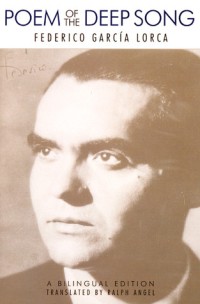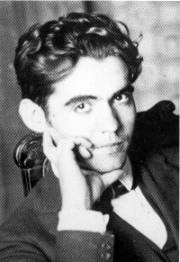
Poem of the Deep Song
تأليف : Federico García Lorca
النوعية : الشعر
نعتذر، هذا الكتاب غير متاح حاليًا للتحميل أو القراءة لأن المؤلف أو الناشر لا يسمح بذلك في الوقت الحالي.
حفظ
Poem of the Deep Song by Federico García Lorca ..
“Poema del cante jondo and Romancero Gitano, the books of poems that Lorca wrote first, out of his excited response to gypsy music, poetry, and dance all around him in Granada, contain some of his most powerful and trenchant lyrical work, original, inimitable, daring, and a clear expression of the duende, the Dionysian daemon in poetry, of which he wrote eloquently. A new, fresh, consistent translation—and Mr. Angel’s is all of these—is a welcome return to that wild dance, in this bilingual edition.”—W.S. Merwin
Cante jondo. Deep Song. A poem meant to be sung, not with a pretty voice but with a cry, to break the silence and stillness of the body. A rustic form of flamenco. A poem written to remind Spain of its deep musical soul, the primitive song of the Andalusian Gypsies. A poem by Federico García Lorca written in 1921 when he was only twenty-three and had but fifteen years left to live before the Franco regime murdered him in the hills of Granada.
Translator Ralph Angel returns to Lorca’s strange, unique rhythms and to the irrational, intuitive duende. This incantatory translation, every bit as revolutionary as the original was almost a century before, reconfirms what Lorca said of this work, that it is “a slammer, a wavering emission of the voice . . . [that] makes the tightly closed flowers of the semitones blossom into a thousand petals.”
Poem of the Deep Song by Federico García Lorca ..
“Poema del cante jondo and Romancero Gitano, the books of poems that Lorca wrote first, out of his excited response to gypsy music, poetry, and dance all around him in Granada, contain some of his most powerful and trenchant lyrical work, original, inimitable, daring, and a clear expression of the duende, the Dionysian daemon in poetry, of which he wrote eloquently. A new, fresh, consistent translation—and Mr. Angel’s is all of these—is a welcome return to that wild dance, in this bilingual edition.”—W.S. Merwin
Cante jondo. Deep Song. A poem meant to be sung, not with a pretty voice but with a cry, to break the silence and stillness of the body. A rustic form of flamenco. A poem written to remind Spain of its deep musical soul, the primitive song of the Andalusian Gypsies. A poem by Federico García Lorca written in 1921 when he was only twenty-three and had but fifteen years left to live before the Franco regime murdered him in the hills of Granada.
Translator Ralph Angel returns to Lorca’s strange, unique rhythms and to the irrational, intuitive duende. This incantatory translation, every bit as revolutionary as the original was almost a century before, reconfirms what Lorca said of this work, that it is “a slammer, a wavering emission of the voice . . . [that] makes the tightly closed flowers of the semitones blossom into a thousand petals.”
المزيد...



